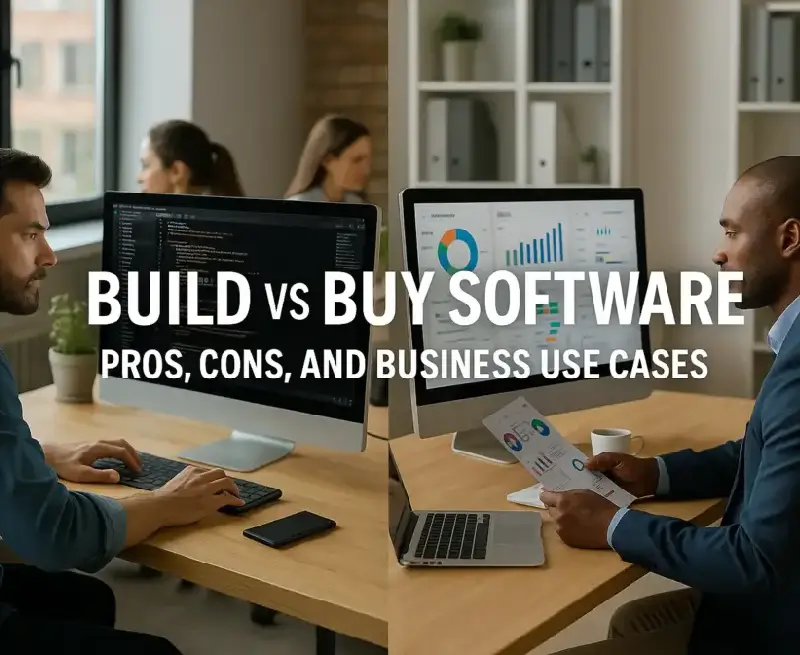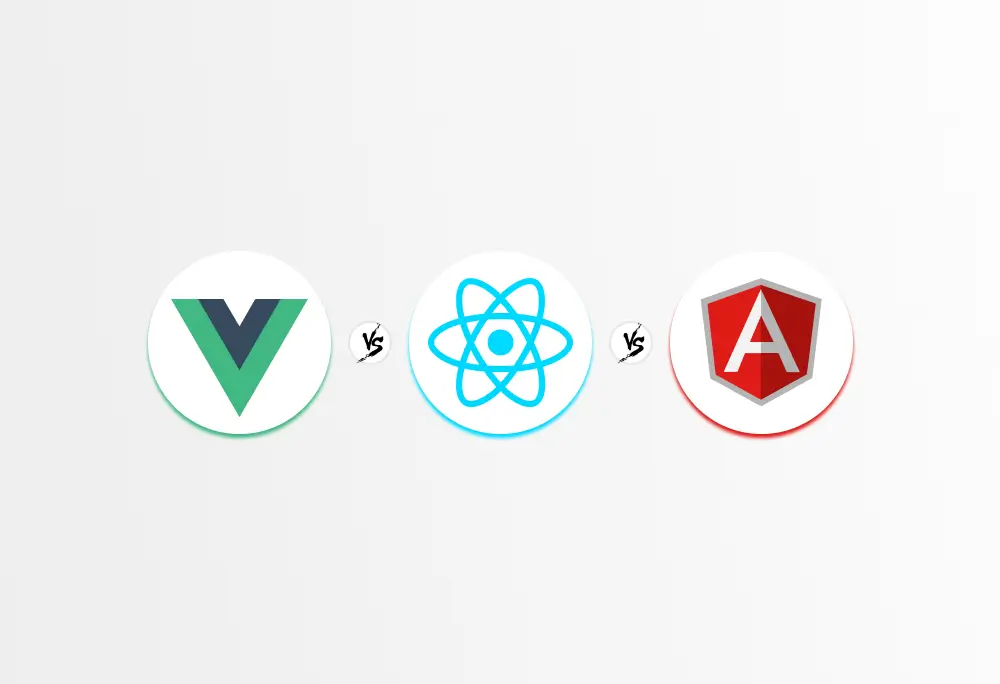
From strategizing to market positioning, businesses need to manage a multitude of competing priorities. One of the most significant is deciding whether to Build or Buy Software. This issue is no longer just an IT imperative, it shapes resource allocation, time-to-market, innovation and strategic differentiation. The “build versus buy software” issue involves complex myriad crosses of diplomacy, which makes it a simple business decision at face, but requires consideration of objectives, budgets, scope, timing, and the comprehensive playbook.
In this blog, we analyze the build versus buy software debate, bringing out its practical usages, advantages, and disadvantages. We will also discuss how to create a build vs buy decision model and how consultancy in software development and customized software development works to empower the decisions you make. Whether a startup or an enterprise, all readers are welcomed with a guide to assist in processes regarding software acquisitions.
What Does Build vs Buy Software Mean?
The build versus buy decision reflects a company’s two approaches of software acquisition:
Build Software: A company designs and develops a program internally or, more commonly, hires an external IT contractor (or consulting firm) to do so. This option addresses all the business-specific requirements and offers full customization.
Buy Software: A company can acquire licenses or subscriptions for software products developed and offered by other companies. The approach usually takes less time to implement, and the upfront costs are also less compared to building software from scratch.
When making strategic decisions, companies should not lose sight of long-term goals and context-related specifics associated with each particular situation.
Pros of Building Software
-
Tailored to Business Needs
Custom-built software is specifically designed to meet the unique requirements of your business processes. It offers unmatched flexibility and feature customization.
-
Enhanced Scalability
With built software, you can add or modify features as your business grows. Custom software development services allow for seamless scalability without vendor-imposed limitations.
-
Full Control and Ownership
You own the source code and intellectual property. This allows for full control over updates, integrations, and future development.
-
Competitive Advantage
Businesses that develop proprietary tools can gain a significant edge over competitors using generic solutions. Unique functionality can become a core business differentiator.
-
Deeper Integration
Built software integrates more effectively with existing systems, reducing operational friction and data silos.
-
Enhanced Security
With full control, your team or software development company can implement industry-specific security protocols and compliance standards.
-
Innovation Freedom
By choosing to build, your business can innovate faster. You aren’t bound by a vendor’s roadmap, giving your internal team or custom development partner freedom to experiment and improve rapidly.
-
Long-Term ROI
Though building may seem costly at first, over time it can offer higher ROI due to saved licensing costs and optimized operations.
-
Brand Differentiation
Unique, branded interfaces and features make your application stand out in the market, strengthening customer engagement and loyalty.

Cons of Building Software
-
High Initial Investment
Developing software from scratch requires significant financial resources. This includes hiring developers, project managers, QA testers, and possibly outsourcing to a software development company.
-
Longer Time-to-Market
Custom software takes time to plan, build, test, and deploy. If your business needs a quick solution, building may not be viable.
-
Ongoing Maintenance
You’re responsible for maintenance, updates, and security patches. Without proper infrastructure or support from software development consulting services, this can be resource-intensive.
-
Technical Risk
Building software involves the risk of project delays, cost overruns, and failed delivery due to technical complexity.
-
Requires Specialized Expertise
Not all companies have in-house capabilities. Partnering with a software development company becomes crucial for success.
-
Potential Team Disruption
Focusing internal resources on custom software development may take attention away from core business operations, reducing productivity in the short term.
-
Resource Drain
The time and effort required may impact other critical projects. Effective prioritization is necessary to balance operations and innovation.
-
Dependence on Developer Continuity
If your key developers leave, you may face challenges in updating or maintaining the software efficiently.
Read More: How to Build an MVP (Minimum Viable Product): A Comprehensive Guide
Pros of Buying Software
-
Faster Deployment
Commercial off-the-shelf (COTS) software is ready to use, allowing businesses to go live almost immediately.
-
Lower Upfront Costs
Buying software often comes with subscription or licensing fees that are easier on the budget compared to full-scale development.
-
Regular Updates and Support
Vendors typically offer frequent updates, technical support, and security maintenance, ensuring your software remains secure and up to date.
-
Proven Market Adoption
Established software solutions have been tried, tested, and optimized based on user feedback, reducing the likelihood of bugs or performance issues.
-
Reduced IT Burden
Your team doesn’t need to worry about development cycles, patching, or troubleshooting.
-
Scalability Through Vendor Offerings
Many vendors now offer modular plans. You can start small and scale as needed, adding premium features or integrations over time.
-
Vendor Ecosystem Benefits
With buying, you often get access to an ecosystem of tools, integrations, and third-party apps that enrich the software’s capabilities.
-
Minimal Training Overhead
Most commercial tools are designed for user-friendliness, reducing the time and cost of training your team.
Cons of Buying Software
-
Limited Customization
Off-the-shelf products may not fully align with your workflows. Adapting your business to the software, rather than the reverse, can reduce efficiency.
-
Recurring Costs
Monthly or annual subscriptions can accumulate to become more expensive than custom-built solutions over time.
-
Vendor Dependency
Your ability to evolve with market changes may be limited by the vendor’s roadmap. Vendor lock-in can restrict flexibility and innovation.
-
Integration Challenges
Pre-built software may require extensive customization to work seamlessly with your existing tech ecosystem.
-
Data Control Issues
Your critical data resides on third-party infrastructure, raising concerns about compliance and control.
-
Inflexibility to Evolve
Over time, your business needs may outgrow the capabilities of the purchased software, and scaling can become inefficient or costly.
-
Hidden Costs
Training, support, premium features, and integration fees may add significant hidden expenses over time.
Build vs Buy Decision Framework
A systematic approach to the build vs buy software dilemma can simplify the decision-making process. Here’s a robust build vs buy decision framework to guide you:
-
Define Business Objectives
Start by clearly articulating what you want the software to achieve. Is it core to your business, or is it a support function?
-
Analyze Technical Feasibility
Review your current infrastructure and capabilities. Do you have the technical talent or need to hire a software development company?
-
Budget Analysis
Compare initial and long-term costs for both options. Conduct a build vs buy analysis to understand ROI and total cost of ownership.
-
Time Constraints
If you need a solution in weeks, buying may be your only option. If time is flexible, building can yield better customization.
-
Future Roadmap Compatibility
Determine how the software aligns with your 3–5 year vision. Will it scale with your company’s growth?
-
Regulatory & Security Requirements
If you’re in an industry with strict compliance rules, building may be necessary to meet specific security or data-handling standards.
-
Competitive Landscape
Consider if a tailored solution could provide a competitive edge over using widely available tools.
-
Consult with Experts
Engaging software development consulting services can help you weigh pros and cons objectively and avoid costly mistakes.

Build vs Buy Software Analysis Table
| Criteria | Build Software | Buy Software |
| Cost | High upfront, low over time | Low upfront, high over time |
| Deployment Time | 3–12 months or longer | Days to weeks |
| Customization | Fully customizable | Limited to vendor options |
| Maintenance | In-house or contracted | Vendor-managed |
| Scalability | High | Moderate |
| Integration | Seamless with existing systems | May require extensive APIs |
| Vendor Lock-In | None | High |
| Competitive Advantage | Strong | Weak to moderate |
| Data Ownership | Complete control | Shared with vendor |
| Innovation Flexibility | Very high | Limited |
You May Like To Know: Offshore Software Development: A Comprehensive Guide
When a Hybrid Approach is the Best Fit
Many businesses adopt a hybrid model—buying general-purpose software and building solutions for core or unique functions. For instance, a company might buy an off-the-shelf HR system but develop its own project management tool tailored to specific team needs. This hybrid approach balances speed with flexibility.
When to Reevaluate Your Build vs Buy Strategy
Business needs evolve. A software solution that once fit perfectly might now hinder growth. Companies should regularly reevaluate their build vs buy strategy, especially when scaling, entering new markets, or shifting their business model. Periodic software development consulting services can assist with ongoing alignment.
Industry-Specific Scenarios
- Healthcare: Custom-built patient record systems help meet HIPAA compliance, unlike generic solutions.
- Fintech: Banks and finance firms build secure platforms to control encryption and protect sensitive data.
- eCommerce: Online retailers may buy storefront platforms but build their own logistics or recommendation engines.
- Logistics: Real-time fleet tracking may demand custom software integrated with GPS and weather APIs.
- Education: Schools might use bought learning management systems (LMS) but build internal apps for grading and analytics.
- Manufacturing: Firms often require custom solutions for supply chain visibility or machine automation control.
Conclusion
Deciding whether to build or buy software isn’t just a technical choice—it’s a strategic decision that can shape the future of your business. A well-executed build vs buy software analysis, supported by a structured decision-making framework, can help align your technology investments with your company’s long-term vision and operational goals.
Building software offers complete control, deep customization, and a long-term competitive edge—ideal for businesses aiming to innovate and scale on their own terms. Buying software, on the other hand, provides speed, affordability, and vendor-supported reliability, making it perfect for companies seeking quick deployment and proven solutions.
Whichever path you choose, the key is to base your decision on a clear understanding of your needs, resources, and growth objectives.
At LuminoGuru, we empower businesses to make informed, strategic technology decisions. Whether you need end-to-end custom software development services or strategic guidance through our software development consulting services, we’re here to support you every step of the way.
Let’s transform your vision into reality—contact LuminoGuru today and discover the smartest path forward in your build vs buy software journey.
FAQs: Build vs Buy Software
Q: What is the primary factor in a build vs buy software decision?
The major consideration is whether your business requires specific customizations or needs something that can be deployed quickly and at a lower cost.
Q: Is building software always more expensive?
At first, yes. But it could be cost-effective later on, especially if the software becomes critical to the business.
Q: How do software development consulting services help in this decision?
They assess the specific requirements, financial constraints, and the overall objectives of the business in order to propose the best viable strategy.
Q: Can I switch from buying to building later?
Yes, a lot of businesses tend to opt for a purchased option at first and switch to developing custom software later on as they grow.
Q: Does buying software mean sacrificing competitive advantage?
Not really. For functions that are not part of the core business, purchasing software can still be a tactical and effective decision.
Q: How can a software development company support my build strategy?
They hire custom expert developers to schedule an ongoing maintenance plan specifically tailored to your ever-changing needs.

 Software Development
Software Development Food Delivery
Food Delivery Taxi Booking
Taxi Booking E-Commerce
E-Commerce Real Estate
Real Estate Healthcare
Healthcare



